'If you croak we don't care': Brutality in Belarus
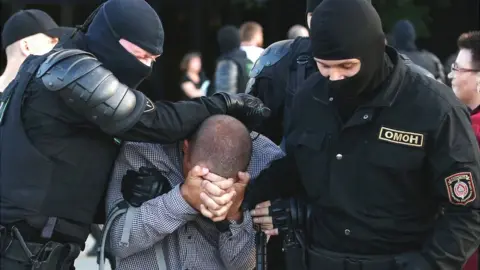 Getty Images
Getty ImagesVictims of police brutality in Belarus have told the BBC about their experiences of the crackdown after the disputed re-election of President Alexander Lukashenko.
There have been many complaints of police beatings and other abuses that may amount to torture.
The opposition accuses Mr Lukashenko - in power for 26 years - of stealing victory on 9 August, in an election widely criticised for a lack of transparency and muzzling of dissent. Hundreds of people including many police have been hurt in protests unprecedented for modern Belarus.
Most victims interviewed by BBC Russian declined to give their full names, fearing persecution by the authorities. Here are excerpts from their eyewitness descriptions in Minsk.
Warning: you may find some of the accounts below disturbing.
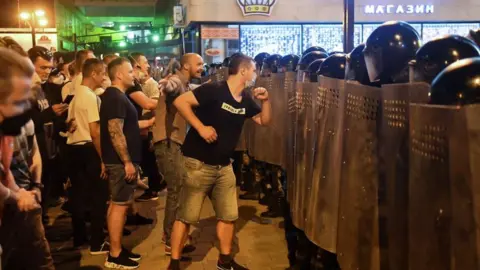 Getty Images
Getty ImagesAlina Beresneva, 20: 'They were forced to kneel half-naked'
On the night of 9-10 August my friends and I were returning from central Minsk and came across a group of Omon [police special forces]. We hadn't been protesting, but still they threw me to the ground - I still have the scratches on my arms - and then they bundled us into a bus.
They took us to Okrestina Street [the location of a police detention centre]. At the entrance stood a man who shouted: "Faster, you bitches!" I said: "Why are you speaking to us like that?" He grabbed my neck and kicked me against the wall.
They put us 13 girls into a cell designed for four. The night went by and at about midday they counted us and took down our names. We were all hungry, realising we hadn't eaten for 24 hours, and started asking for food, saying we'd pay for it. They answered: "No, bitches, now you'll find out who to vote for". We were shocked by this language.
I tried reading the statement they wanted me to sign. "Please let me understand what I'm signing," I protested. I was told: "I'll tell you, you bitch, get on and sign it, or I'll [rape] you and put you away for another 20 days." I was shocked, crying, my tears fell on that statement. I wrote "I agree" and signed it, without even knowing what I was signing.
The police vans came for us on 11 August. Through the window we saw how they were mistreating the guys. They were forced to kneel half-naked, with their backsides in the air, hands behind their heads. Anyone who budged was beaten with batons.
Previously I wanted to join the police, to protect the people, human rights, but after being there, no, not any more. Now I just want to leave this country, with my family, so I don't have to stay here.
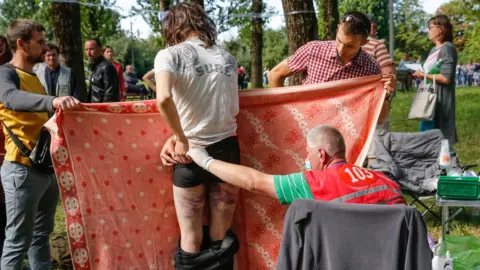 EPA
EPASergei, 25: 'They yelled at me and told me to crawl'
I was taken in a police van - there were about 20 of us, thrown in one on top of another. An Omon guy walked over us, they pressed their boots into our necks, we were suffocating. People were getting swollen hands from the handcuffs - and if one complained they would hit his hands.
There was an asthmatic among us, he was gasping for breath. The Omon guy pressed his boot on his neck and said "if you croak we don't care".
One guy didn't want to unlock his phone. They stripped him and said that if he didn't reveal his password they'd rape him with batons. So he agreed.
They yelled at me and told me to crawl, which I did slowly, and they kept on beating me. That carried on for some time, then some others were thrown on top of me, I could hardly breathe. When I was pushed up against a wall I realised I was bleeding from a head wound. I passed out a few times.
The doctors know people are being tortured, they try to get them out. In all I was given 12 stitches for three wounds, I had surgery and they took x-rays. After a few hours in hospital my friends collected me.
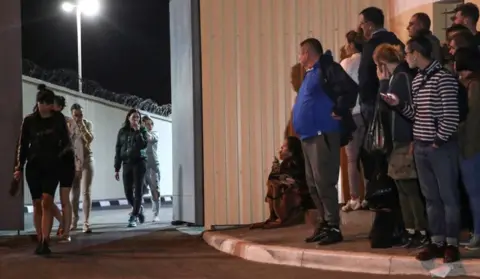 Getty Images
Getty Images
More about the protests in Belarus
- LETTER FROM MINSK: Shocked by violence, people lose their fear
- SPREADING THE NEWS: How messenger app bypassed blackout
- PROFILE: The stay-at-home mum challenging Belarus's longtime ruler
- THE CONTEXT: Five things you may not know about Belarus

Oleg, 24: 'Only water and a loaf of bread'
I'm a truck driver, not political at all, I'm no enemy of the people. I saw what was happening on the internet, saw that children and grandmothers were joining in. I'm a young man, I thought, what am I doing sitting at home? So I went down there too.
I was arrested near midnight on 10-11 August. The Omon sprang on us from behind, kicked us, then twisted our arms behind our heads and carried on kicking us.
For an hour and a half we were made to kneel with our heads down, by a concrete wall. The ground was stony - my knees are still black from that. If anyone protested he was beaten up. One bloke shouted that he was an officer in the FSB [Federal Security Service]. They surrounded him, punched him in the solar plexus, about five laid into him with batons. A reporter from Russia was beaten up, he was screaming.
Later there were 120 of us packed into a cell and in 24 hours they only gave us water and a loaf of bread.
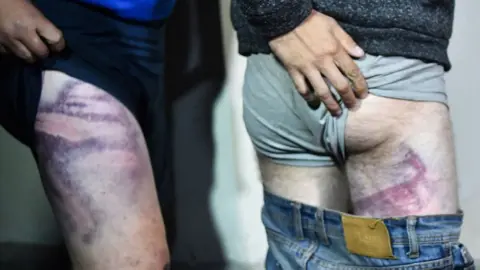 AFP
AFPMarylya, 31: 'Rhythmical thumping of their batons'
On 12 August I was in a car with friends, going home after 11pm. A traffic cop pulled us over and then a lot of guys in black uniforms, black balaclavas, came over and told us to get out.
They made us show them what was on our mobile phones, then they discussed what to do with us and decided to take us to a police station.
They stood behind us, mocking us, saying "if only you'd stayed at home". The guy with us - his hand went numb, and they ordered him not to move it. They said: "why are you hanging around with protesters, if you're so sickly?"
They said things like: "You chuck Molotov cocktails at us", or "the West is funding all of this".
Then we heard them bring a guy in and heard the rhythmical thumping of their batons on him. Several people were beating him up cruelly. He begged them to stop, but they swore and carried on. It was terrifying.
Nikita Telizhenko, 29, Russian journalist: 'They cannot speak, they howl'
They grabbed my phone. They decided that as I was writing something and had the internet I must be a co-ordinator.
The cruelty started at the Moskovsky police station where they took us. They were twisting our arms, and if anyone's head was raised too high he would get whacked on the back of the head with a baton or shield.
There was blood and excrement on the floor. They threw us on the floor, you couldn't turn your head. Luckily I had a mask on. The worst moment was - you're sitting there and on the floor below, in the corridors, they're beating people up so viciously that they cannot speak, they howl.
They put 20 to 30 of us in each cell. There was no ventilation and after an hour we were drenched in sweat.
When they took us to Zhodino [prison] they said: "Say farewell to life, they're going to kill you here." But to our surprise we were treated OK there. I spent about four hours there, then a colonel came for me, I was released and they went to get my things.
A [Russian] consular official met me at the exit. They expelled me from Belarus, banned me from re-entering for five years, and took me to Smolensk.
Interviews done by BBC Russian's Elizaveta Fokht, Anna Pushkarskaya, Oksana Chizh.
